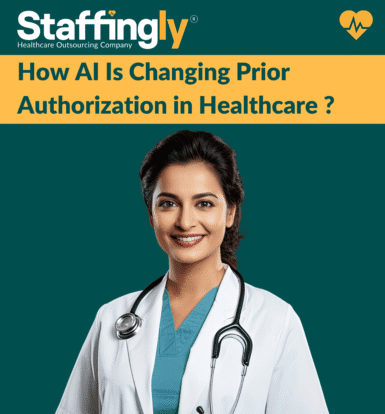On-Demand Outsourcing BPO Services for Healthcare Providers With 24/7 Coverage!
Save up to 70% on staffing costs!
Browse Specialty Staffing Services
Prior Authorization Is Costing Your Practice 16+ Hours Per Week: Here’s How to Fix It
Prior authorization has become one of the most burdensome administrative tasks in modern healthcare. What was originally designed as a cost-control measure has evolved into a time-consuming process that drains resources from medical practices of all sizes. Research consistently shows that the average medical practice spends 16 or more hours per week navigating the prior authorization maze, and for many practices, the real number is significantly higher. This isn’t just an inconvenience. Those lost hours translate directly into delayed patient

Does Healthcare Outsourcing Actually Deliver Cost Savings?
Healthcare professionals across Reddit are asking the same question: “How realistic is cost reduction through healthcare outsourcing?” A mid-sized hospital staff member shared, “There’s been a lot of chatter about outsourcing parts of our operations to cut costs… but I’m skeptical about how much you really save once you factor in the transition, service disruption, and learning curve for staff.” The thread quickly turned into a real-world debate among IT, clinical, and administrative staff who’ve seen outsourcing from the inside.

Is Healthcare Outsourcing Becoming the Standard for Hospitals Today?
Across healthcare forums, professionals are debating a growing trend that’s reshaping hospital operations. One Reddit user shared, “They’ve been bringing in contract coders from overseas. Now, a whole group of in-house billers and coders just got let go, and management says the work will stay outsourced going forward.” The discussion quickly filled with concern, frustration, and real-world stories from coders, RCM managers, and IT professionals. “Outsourcing has been a cycle for a while,” one veteran coder wrote. “Companies outsource, get

Can AI Truly Improve Healthcare Insurance Verification Accuracy and Reliability?
Healthcare professionals are increasingly asking a tough question: “Has anyone had success using an AI bot for insurance verification?”A medical assistant working for a concierge practice described their frustration: “We’re out-of-network with all plans, but I’d like to see if diagnostics could at least count toward patient deductibles.” That single line captures a growing challenge across private and concierge medicine using automation and AI to simplify complex, inconsistent payer systems. In theory, AI should streamline eligibility checks. In reality, “insurance

How AI Is Changing Prior Authorization in Healthcare ?
Beginning in January 2026, patients on traditional Medicare (not Medicare Advantage) in six states Arizona, New Jersey, Oklahoma, Ohio, Washington, and Texas will face AI-based prior authorization for spine surgery and other select procedures. A Reddit user summed up the unease: “This seems dangerous when you consider the disruption in healthcare by insurance companies who already use AI algorithms to ration healthcare.” The 6-year pilot, called the WISeR Model, uses algorithms to identify “wasteful or inappropriate” services. But as one

How Healthcare Teams Securely Automate Patient File Management?
Healthcare offices are drowning in paperwork, and even digital files aren’t making it easier. One healthcare professional recently asked on Reddit: “Is there software that is HIPAA compliant that can read selected documents from a folder and autorename them to a specified rule, like date of birth and patient name?” Their practice receives endless faxes for imaging orders, and staff are struggling to locate files when patients call to schedule. Manual renaming is tedious, error-prone, and delays care coordination. As

Can Virtual Assistants Prevent Insurance Billing Errors?
Healthcare forums are full of anxious patients trying to decode insurance billing and this post captures it perfectly. One patient wrote, “I’ll be billed almost $400 out-of-pocket for the visit. Should I call before I go in to see if they’ll bill it under a family planning visit or can I ask them to do it while I’m there?” This confusion reflects what many patients experience daily insurance policies promise “no cost-sharing” for preventive care, but billing codes can turn

Can Having Two Health Insurances Cause More Problems Than Benefits?
“I’ve been on SSDI and Medicare Advantage (Cigna) for seven years. It’s my secondary insurance. My primary is Blue Cross Blue Shield from my husband’s job. It worked well for a while, but now it feels like having both may be more of a hindrance than anything.” This statement from a Reddit discussion captures the ongoing confusion surrounding Medicare Advantage versus supplemental insurance. Many patients are unsure whether maintaining two policies is beneficial or unnecessarily complicated. Across healthcare communities, both
 Book a Demo to Build Your Team Today!
Book a Demo to Build Your Team Today!


 Read Case Studies
Read Case Studies 



 Virtual Medical Assistants
Virtual Medical Assistants



